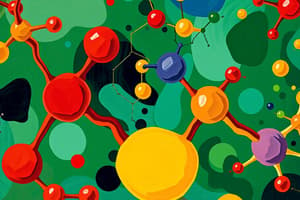Podcast
Questions and Answers
What are the 4 main classes of large biological molecules?
What are the 4 main classes of large biological molecules?
Carbohydrates, lipids, proteins, and nucleic acids
What is a polymer?
What is a polymer?
Smaller molecules that are chained together to make large molecules
What can break a polymer chain?
What can break a polymer chain?
Hydrolysis
What are carbon-based molecules called?
What are carbon-based molecules called?
What are monosaccharides?
What are monosaccharides?
What are hydrocarbons?
What are hydrocarbons?
What is a carbohydrate?
What is a carbohydrate?
What is the formula that monosaccharides are a multiple of?
What is the formula that monosaccharides are a multiple of?
What is a disaccharide?
What is a disaccharide?
What are polysaccharides?
What are polysaccharides?
What are the 3 types of polysaccharides?
What are the 3 types of polysaccharides?
What is starch?
What is starch?
What is glycogen?
What is glycogen?
What is cellulose?
What is cellulose?
What types of molecules are fats and lipids?
What types of molecules are fats and lipids?
What are lipids?
What are lipids?
What is a fat?
What is a fat?
What is the main function of fat?
What is the main function of fat?
What does it mean for a fat to be unsaturated, and what do they do?
What does it mean for a fat to be unsaturated, and what do they do?
What does it mean for a fat to be saturated, and what do they do?
What does it mean for a fat to be saturated, and what do they do?
What are two important lipids with a variety of functions?
What are two important lipids with a variety of functions?
What is a protein?
What is a protein?
Where can structural proteins be found?
Where can structural proteins be found?
What is a polypeptide?
What is a polypeptide?
What is denaturation?
What is denaturation?
The monomer of a carbohydrate is a ______.
The monomer of a carbohydrate is a ______.
The function of carbohydrates includes ______.
The function of carbohydrates includes ______.
The element composition of carbohydrates is ______.
The element composition of carbohydrates is ______.
Examples of carbohydrates include ______.
Examples of carbohydrates include ______.
The monomer of a lipid is ______.
The monomer of a lipid is ______.
The function of lipids includes ______.
The function of lipids includes ______.
The element composition of lipids is ______.
The element composition of lipids is ______.
Examples of lipids include ______.
Examples of lipids include ______.
The monomer of a protein is ______.
The monomer of a protein is ______.
The function of proteins includes ______.
The function of proteins includes ______.
The element composition of proteins includes ______.
The element composition of proteins includes ______.
Examples of proteins include ______.
Examples of proteins include ______.
Flashcards are hidden until you start studying
Study Notes
Large Biological Molecules
- Four main classes: carbohydrates, lipids, proteins, and nucleic acids.
- Polymers consist of smaller recurring units called monomers.
Polymerization and Hydrolysis
- Polymers are formed through dehydration reactions.
- Hydrolysis is the reaction that breaks down polymers into monomers.
Organic Compounds
- Carbon-based molecules are referred to as organic compounds.
Carbohydrates
- Simplest carbohydrates are monosaccharides, serving as building blocks for larger carbohydrates.
- Monosaccharide formula: CH2O or (CH2O)n; example: glucose (C6H12O6).
- Disaccharides are sugars formed from two monosaccharides.
- Polysaccharides are long chains of monosaccharides linked by dehydration reactions, such as starch, glycogen, and cellulose.
- Starch acts as a storage polysaccharide in plants, while glycogen is the animal equivalent.
- Cellulose provides structural support in plant cell walls.
Lipids
- Lipids are hydrophobic compounds, meaning they do not mix with water.
- Fats are large lipids composed of glycerol and fatty acids, primarily serving as energy-storage molecules.
- Saturated fats contain the maximum number of hydrogen atoms and are solid at room temperature; examples include butter.
- Unsaturated fats have fewer hydrogen atoms due to double bonds, remaining liquid at room temperature; examples include oils like olive oil and corn oil.
- Important lipids with various functions include phospholipids and steroids.
Proteins
- Proteins are polymers made from amino acid monomers.
- Structural proteins are found in hair, skin, and muscle.
- Polypeptides are chains of amino acids that fold into functional proteins.
- Denaturation occurs when polypeptide chains unravel, losing their specific shape and function.
Summary of Monomers and Functions
- Carbohydrates:
- Monomer: monosaccharide
- Function: short-term energy storage, plant structure
- Example: sucrose, starch, cellulose, glycogen
- Lipids:
- Monomer: fatty acids
- Function: long-term energy storage
- Example: triglycerides (fats), phospholipids, steroids
- Proteins:
- Monomer: amino acids
- Function: structural roles, enzymes
- Example: hair, skin, muscles, catalase
Studying That Suits You
Use AI to generate personalized quizzes and flashcards to suit your learning preferences.




